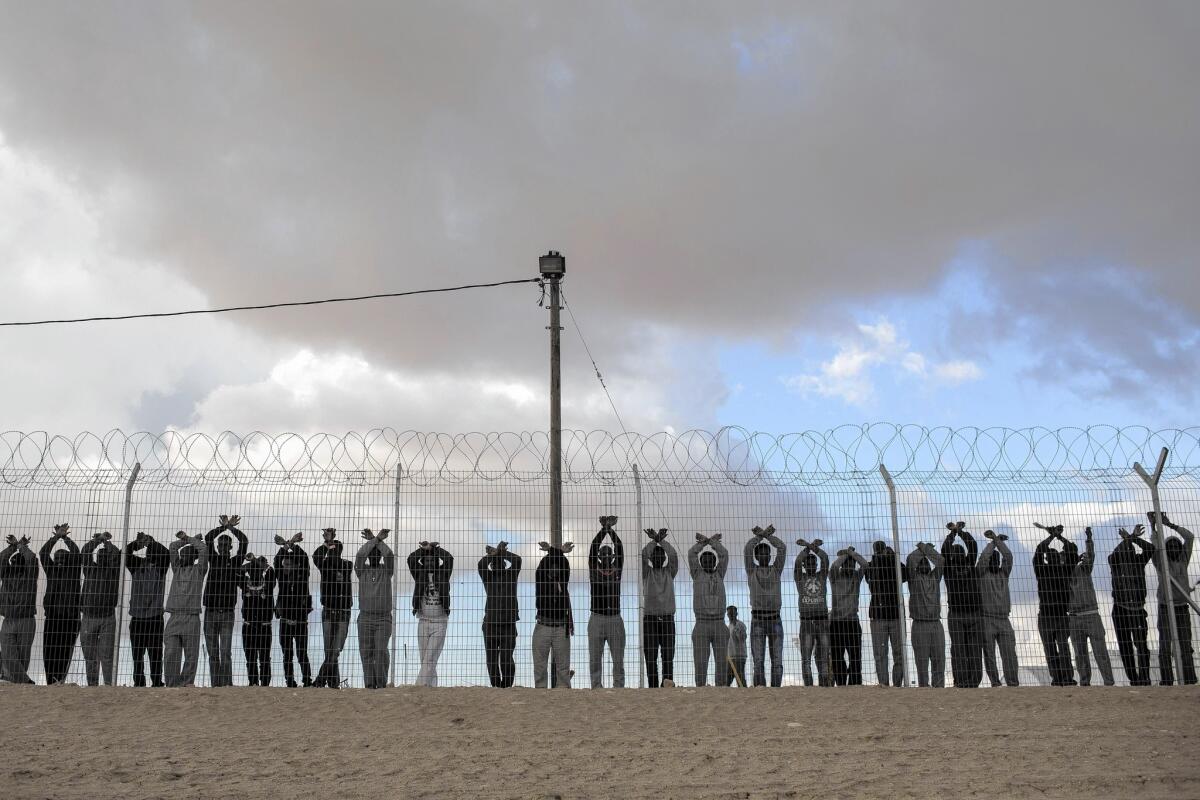In Israel, African immigrants find no refuge
Mutasim Ali, a spokesman for African immigrants in Israel, has a tale of terror and oppression that many officials don’t want to hear.
- Share via
This evening, like most recently, a crowd had massed in Tel Aviv's Lewinsky Park. Huddled under blankets, hundreds of immigrants milled across worn-down grass as speakers passed around a microphone, discussing upcoming demonstrations.
It was the second night of a "sleep-in" protest against the Israeli government's decision to issue detention orders to more than 4,000 African immigrants who have crossed illegally into Israel over the last several years.
Mutasim Ali, tall, with thin shoulders and a cellphone pressed to his ear, made his way through the park slowly. Every few steps, another person tapped his shoulder, shook his hand and asked for help.
One man wanted to know whether Ali could assist him in getting his detention summons delayed. Another had a question about how to file for refugee status. Ali's phone rang; it was a board member of the nonprofit group he leads. Another ring; this time it was a journalist.
Handsome, provocative and fluent in Hebrew, which he learned after fleeing Sudan four years ago, Ali is the public face of an estimated 55,000-strong population that some in Israel wish would quietly disappear. That, he figures, is why he was one of the first people issued a detention order.
But Ali, 27, is not one to go quietly. While other students were studying for their final exams in college, he was reading up on Martin Luther King Jr. and Nelson Mandela and serving time in a Sudanese prison for protesting the government-backed genocide in Darfur. More recently, he has led headline-grabbing strikes in which tens of thousands of immigrants walked off their jobs to demand recognition as refugees in Israel.
Last month, Ali and several nonprofits filed a lawsuit arguing that every detention order dealt to African asylum-seekers should be dismissed because the orders were issued without hearings. As he waited for the court's decision, he found himself in a familiar state of limbo.
The stress of fronting a social movement — of organizing people and communicating their message to the outside world — was beginning to take a toll as he took a seat in a bright cafe on the edge of the park.
"The pressure is enormous," Ali said, rubbing his eyes. A banana-avocado shake sat mostly untouched on the table in front of him.

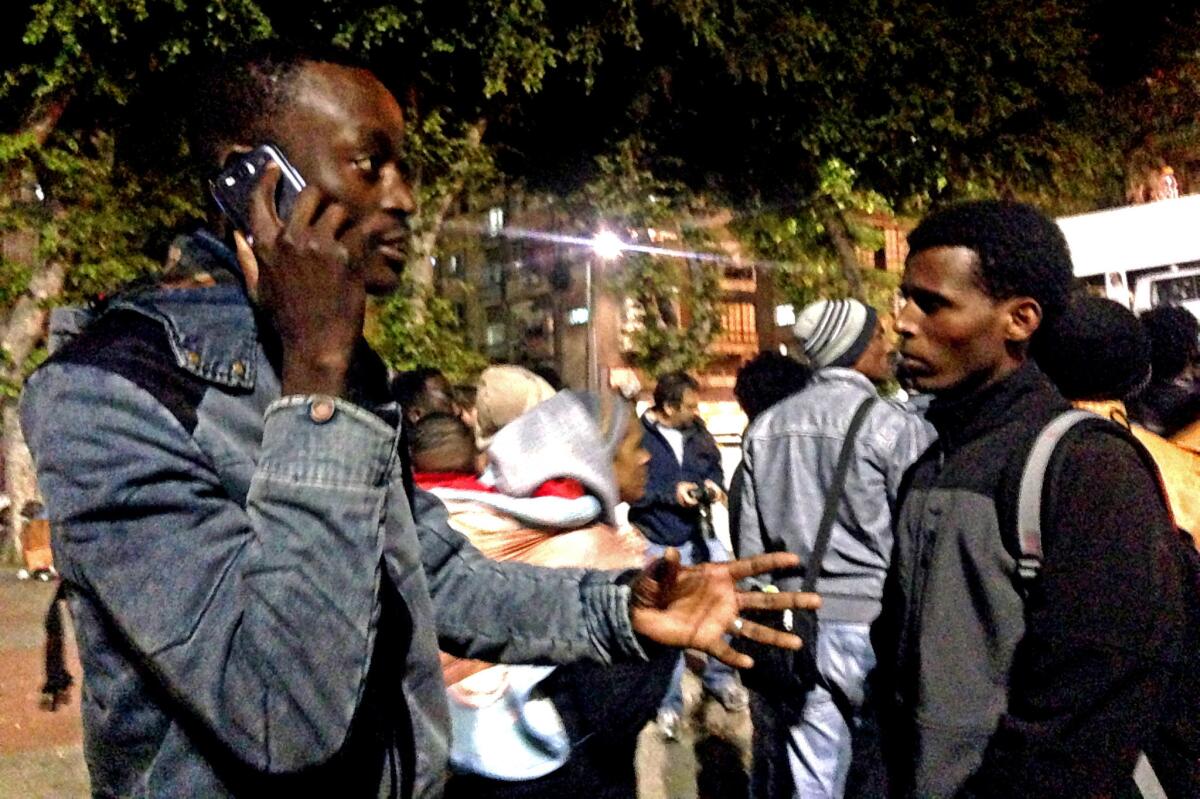
Mutasim Ali, left, seen during a recent protest in Tel Aviv's Lewinsky Park, is the public face of an estimated 55,000-strong African immigrant population that some in Israel wish would quietly disappear. (Kate Linthicum / Los Angeles Times) More photos
The recent wave of protests erupted after last year's passage of an amendment to Israel's Prevention of Infiltration Law, which allows migrants in Israel without permission to be held indefinitely at Holot, an immigrant detention center in the middle of the Negev desert.
Officials call Holot an "open" facility because it is not locked during the day, although detainees are required to check in with guards throughout the day and sleep there at night. The center has drawn criticism from the Office of the United Nations High Commissioner for Refugees, which issued a statement urging Israel not to hold the immigrants in indefinite detention.
Immigrants from Africa started crossing into Israel from Egypt in large numbers about eight years ago. Mostly young men from Sudan and Eritrea, they say they're refugees fleeing conflict and repressive governments. But Israel's leaders, who have come under pressure to act amid escalating tension between the Africans and some of their Israeli neighbors, believe most are economic migrants who should leave.
People look at you with eyes of hatred. You feel like a stranger.”— Mutasim Ali
"These are not refugees but people who are breaking the law and whom we will deal with to the fullest extent of the law," Prime Minister Benjamin Netanyahu said this year. "Protests will not help. Strikes will not help."
Israel, which offers citizenship to anyone who can prove Jewish heritage, has never considered itself "open to immigration on a broader scale," said Daniel Solomon, legal advisor to Israel's Population and Immigration Authority.
But Israel can't just send immigrants back to conflict-ridden Sudan or other nations because international law forbids the deportation of people fearing for their safety at home. Israel's new detention policy, coupled with $3,500 payments to those who agree to leave, is part of a strategy to persuade the Africans to go back on their own, Solomon said.
"I think they're getting the feeling," he said, "that Israel does not intend for them to stay in the long run."

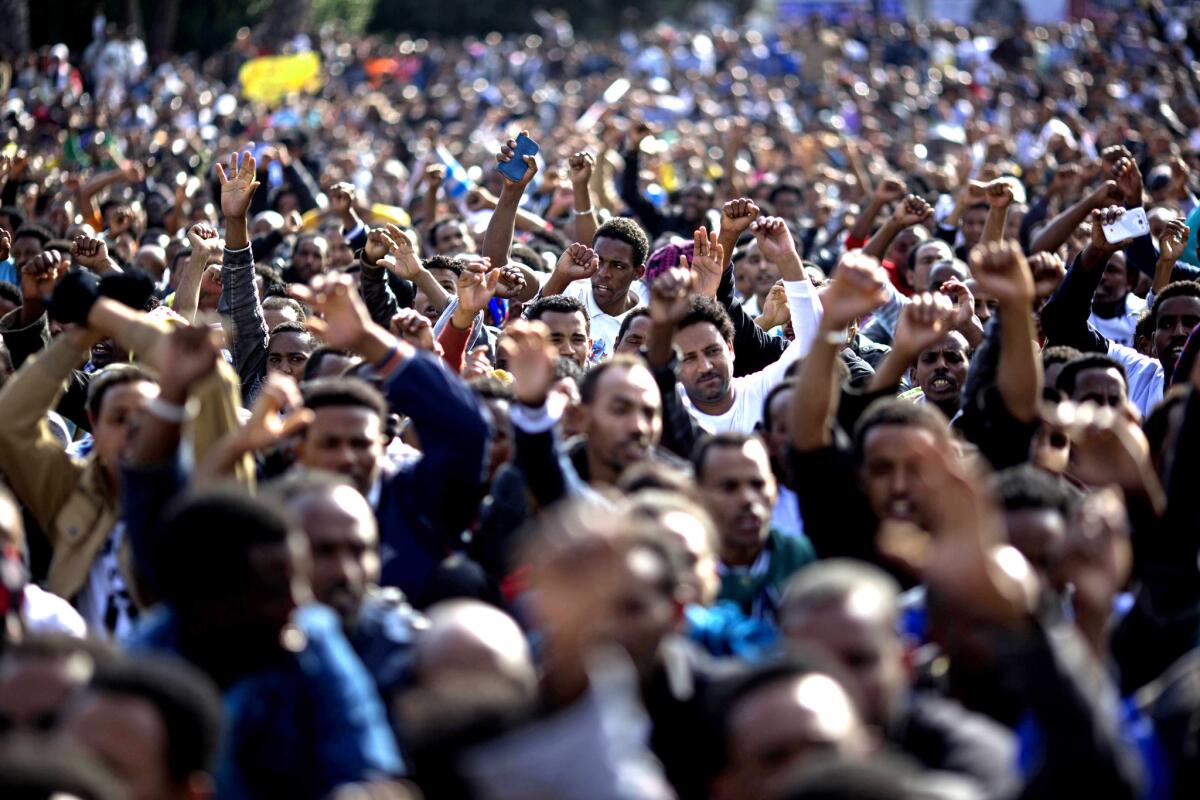
African immigrants chant slogans during a January protest in Rabin Square in Tel Aviv. The Africans, mostly young men from Sudan and Eritrea, started crossing into Israel from Egypt in large numbers about eight years ago. They say they're fleeing conflict and repressive governments, but Israel's leaders say most are economic migrants who should leave. (Ariel Schalit / Associated Press) More photos
Ali says he once thought Israel was the one place where he could find protection.
He was born to teachers in western Sudan's Darfur region. In 2006, while he was away at college in Khartoum, the capital, his village was overrun by militants known as janjaweed. A third of the villagers were killed, he said, although his parents and siblings escaped to a refugee camp.
He tried to join them, but his mother insisted that he complete his studies so that he could one day bring change on a larger scale. "We invested in you," she told him. He hasn't seen her or the rest of his family in more than 10 years.
Ali joined a student protest against the government, which supported the janjaweed's violence against non-Arabs and political rivals in Darfur. He was imprisoned three times for his participation and tortured repeatedly, he said. As soon as he passed his final exams, he left to study law in Egypt.
Once there, he said, he was watched by Sudanese spies. He worried that the same thing would happen in other Arab countries, so he decided to enter Israel because it had no diplomatic ties to Sudan and was itself founded by refugees.
"I believed if I made my way to Israel, they would understand me and give me the protection I need," Ali said. "The Jewish people are the only ones who understand this history I have experienced."
He paid smugglers to help him make the risky journey across the Sinai Desert. At the border, he was picked up by Israeli soldiers, who gave him hummus, a shower and fresh change of clothes. Then they took him to a detention center.
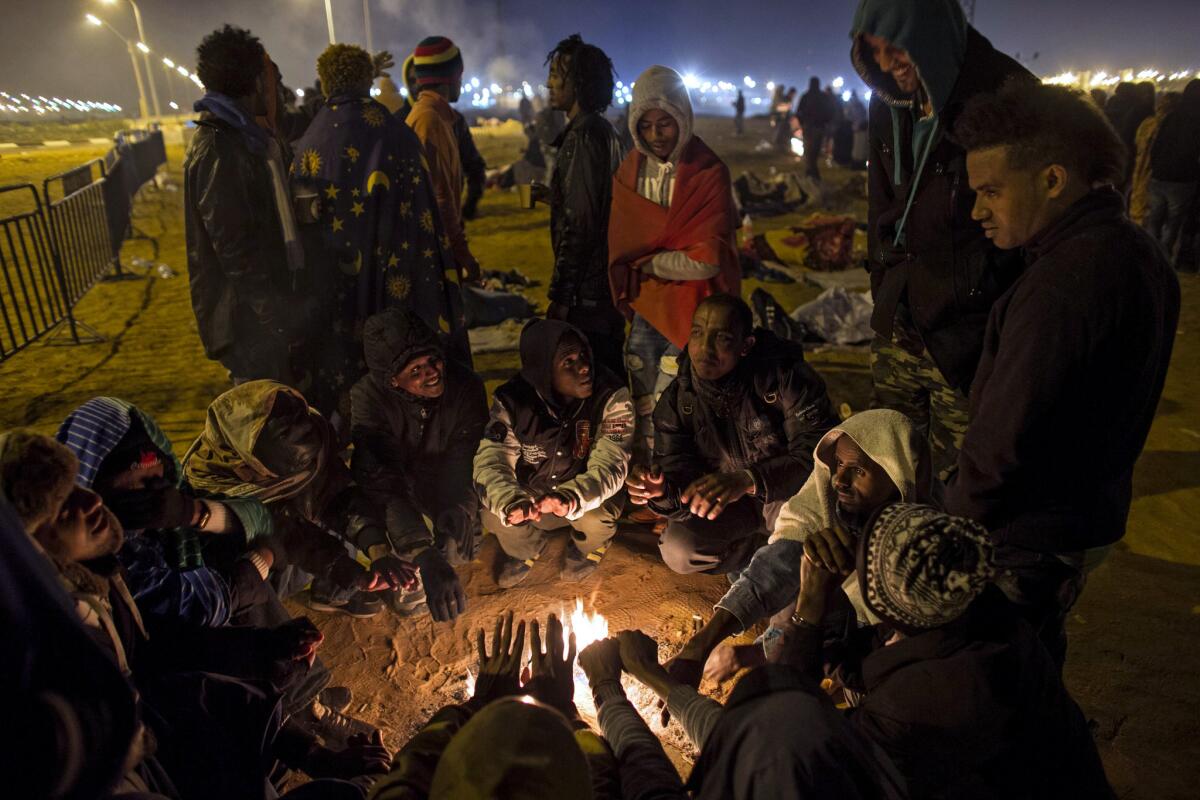
African asylum seekers gather around a fire outside the Holot detention center. Several hundred took part in the February protest against the opening of the center and against Israel's refusal to grant them asylum. (Oliver Weiken / European Pressphoto Agency) More photos
After he organized a hunger strike there, he was released and handed one-way bus tickets to south Tel Aviv. That first night, Ali was preparing to sleep in Lewinsky Park when a Sudanese stranger invited him to stay in the one-room apartment he shared with six others.
Eventually Ali found a job at a hotel, taught himself Hebrew and emerged as a spokesman for the immigrant community, telling his story over and over to diplomats, community groups and journalists.
He arrived at a tense time in the run-down southern part of the city. Longtime residents — many of them legal Jewish immigrants from Arab countries who felt marginalized themselves — were unsettled by the sudden arrival of tens of thousands of Africans.
Residents complained about an increase in crime and the scores of unemployed immigrants stretched out in the park each day. After three Eritrean migrants were arrested on suspicion of raping an Israeli woman, mobs rioted, smashing store windows and attacking the homes of some immigrants with firebombs. Several lawmakers stoked the anger, with lawmaker Miri Regev calling African immigrants a "cancer" on Israel.
Ali has become close friends with some Israeli activists, but said he feels mostly disdain when he walks down a street. "People look at you with eyes of hatred," he said. "You feel like a stranger."
So he tries to put himself in the minds of Israelis. He believes they are traumatized by the long-running conflict with the Palestinians, but he quickly adds that does not excuse the nation's leaders.
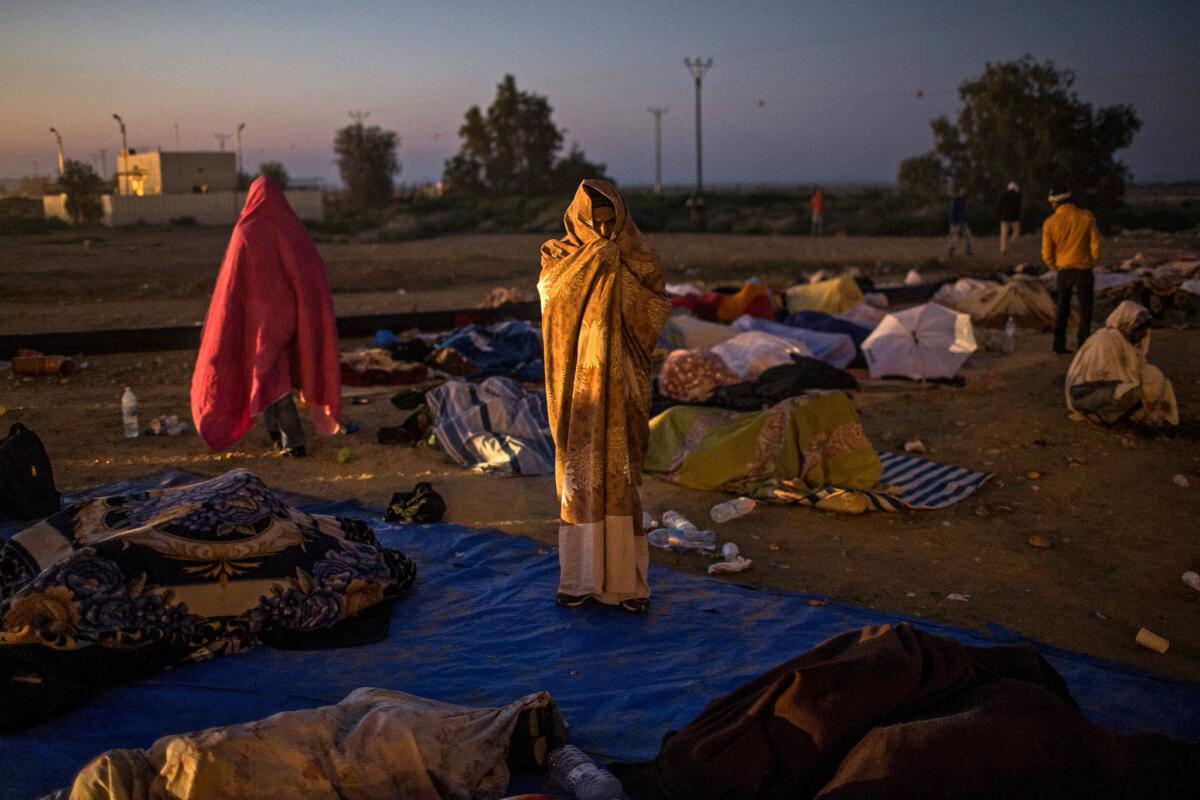
An African asylum seeker covers himself with a blanket as dawn breaks during the second day of protests at the Holot detention center. (Oliver Weiken / European Pressphoto Agency ) More photos
"The Israeli government failed completely to protect us," he said, and the government's slow work in processing refugee claims is "not about whether or not we have a case; it's about the color of our skin."
He believes the government's strategy is working. At this point, more than 2,000 people have accepted stipends.
"People are fed up," he said. "They're leaving."
As he waited for the court's ruling on his detention order this month, Ali kept busy, leading protests outside Holot and launching an effort to bring volunteers from Tel Aviv University to teach free classes at the detention center. He also dreamed of a future outside Israel.
He met with embassy officials from several countries to inquire about political asylum. He recently took the LSAT and applied to law school in New York.
On Tuesday, he put on a suit and went to court. A judge ruled against him. He was given one month to report to Holot.
Follow Kate Linthicum (@katelinthicum) on Twitter
Follow @latgreatreads on Twitter
More great reads
He dreams of famed roller coaster's return
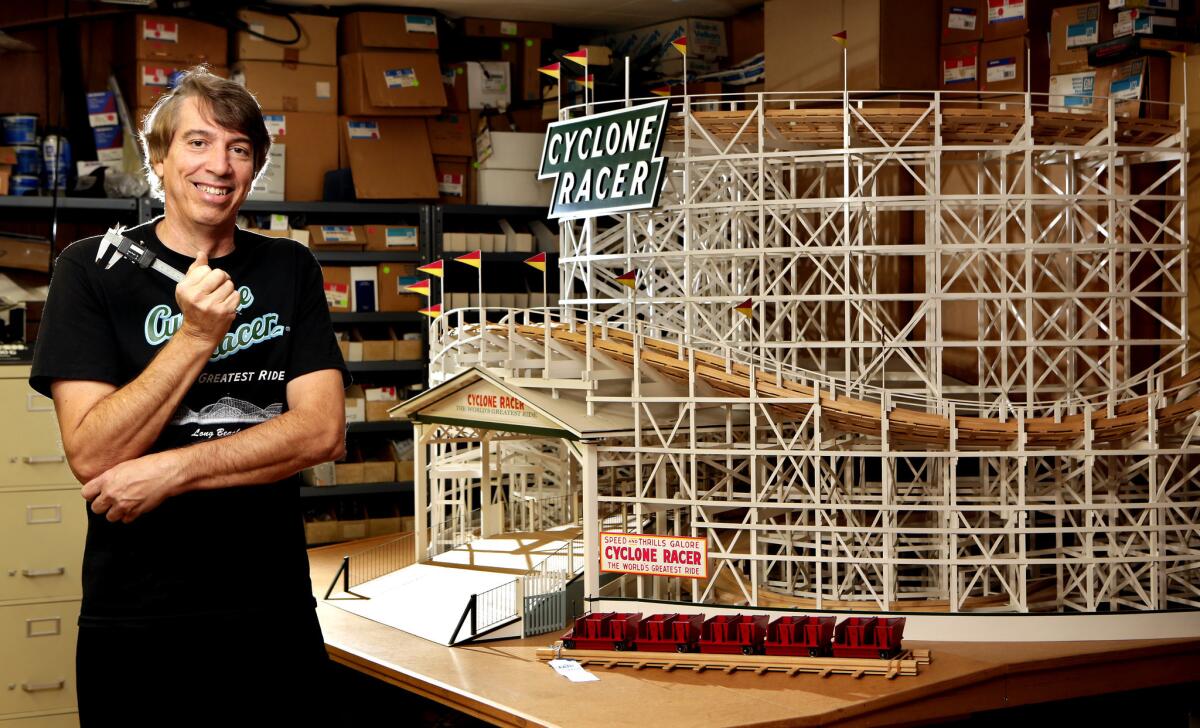
I have the knowledge to put Humpty Dumpty back together again.”
Sign up for Essential California
The most important California stories and recommendations in your inbox every morning.
You may occasionally receive promotional content from the Los Angeles Times.
